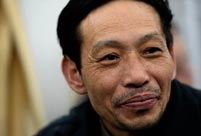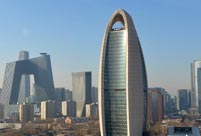 Int'l Snow Sculpture Art Expo in Harbin
Int'l Snow Sculpture Art Expo in Harbin Sichuan money wall for dividend payment
Sichuan money wall for dividend payment Li Na crashes Belinda Bencic in 2nd round at Australian Open
Li Na crashes Belinda Bencic in 2nd round at Australian Open
 Shocking moments when PLA's weapons open fire
Shocking moments when PLA's weapons open fire Famous Lanzhou beef noodles
Famous Lanzhou beef noodles Armed Police hold anti-terrorism drill in SE China's Xiamen
Armed Police hold anti-terrorism drill in SE China's Xiamen Harbin Int'l Ice and Snow Festival opens
Harbin Int'l Ice and Snow Festival opens 'Jin' named the word of the year by cross-strait netizens
'Jin' named the word of the year by cross-strait netizens Chinese scientific expedition goes to build new Antarctica station
Chinese scientific expedition goes to build new Antarctica station
According to the preliminary calculations of State Statistics Bureau on January 20, 2014, China's GDP in 2013 was worth 56.884 trillion yuan. The adjusted value of GDP growth was 7.7 percent compared with the previous year, higher than the expected growth of 7.5 percent, suggesting that China's economic activity continues to operate in a reasonable range.
Some people are concerned because GDP growth has now slowed down for three consecutive years, and 2013's 7.7 percent is a new 14-year low. Has China's economic engine started to run out of power? What is the problem?
In fact, this 7.7 percent rate is the result of active macro-control on the part of the Chinese government. This level of GDP growth is higher than expected and the economic growth that has been achieved has many positive new features.
Under the pressure of economic downturn and pessimistic forecasts, the Chinese government avoided resorting to a large-scale investment plan. Instead China readjusted its industrial structure by increasing the share of the tertiary industry, stimulating domestic demand, and applying other measures to realize a healthier and more sustainable economic growth; at the same time economic vitality was further released through efficient use of stock assets, simplified administrative procedures, delegation of powers to lower levels, and other measures.
The annual data also suggest that in 2013 the added value of the tertiary industry was worth 26.220 trillion yuan, representing a yearly growth of 8.3 percent, which is much higher than the growth rate of the primary and secondary industries. With its active adjustment measures proving to be highly effective, the endogenous power of China's economic growth will continue to increase.
Reform always involves sacrifices. It is worth sacrificing a little economic growth for a more rationally structured endogenous economic growth pattern, which will raise China's economy to higher levels of quality and efficiency.
 A 60-hour journey home
A 60-hour journey home Int'l Snow Sculpture Art Expo
Int'l Snow Sculpture Art Expo Highlights of China's air force
Highlights of China's air force Airline crew stage flashmob dance at Kunming airport
Airline crew stage flashmob dance at Kunming airport Top15 countries to retire to in 2014
Top15 countries to retire to in 2014 Hot supermodel's new photo album released
Hot supermodel's new photo album released Asia's heaviest box girder finishes 'rotation' in Wuhan
Asia's heaviest box girder finishes 'rotation' in Wuhan Completed facade of People's Daily new headquarters
Completed facade of People's Daily new headquarters Chinese-branded car passes North America standard safety test for the first time
Chinese-branded car passes North America standard safety test for the first time Li Na beats Bouchard to reach Australian final
Li Na beats Bouchard to reach Australian final  Explore the sources of PM 2.5
Explore the sources of PM 2.5 Highlights of Chinese airborne troops'exercises
Highlights of Chinese airborne troops'exercises  'Living in ice house' competition held in central China
'Living in ice house' competition held in central China  Chinese figure in Oscar nominations
Chinese figure in Oscar nominations  Top ten aerospace events in China 2013
Top ten aerospace events in China 2013Day|Week|Month